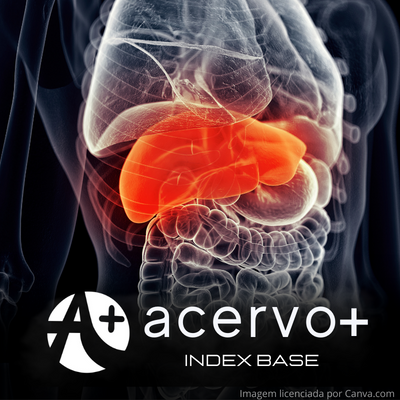Uma abordagem geral da hepatite autoimune: revisão de literatura
##plugins.themes.bootstrap3.article.main##
Resumo
Objetivo: Analisar as características da Hepatite Autoimune (AIH). Revisão Bibliográfica: A AIH é uma doença inflamatória do fígado causada por fatores ambientais em pacientes geneticamente predispostos. Consiste em uma doença hepática inflamatória crônica mediada por células T que afeta todas as idades e caracterizada por preponderância feminina, níveis séricos elevados de transaminase e imunoglobulina G, autoanticorpos circulantes positivos e presença de hepatite de interface na histologia hepática. É uma doença de etiologia desconhecida, que não tratada pode evoluir para cirrose hepática e insuficiência hepática, com risco pequeno (1-2% ao ano), mas significativo, de desenvolvimento de carcinoma hepatocelular. Considerações finais: A hepatite autoimune é uma doença frequentemente fatal se não diagnosticada e tratada precocemente. Esta se caracteriza pela destruição progressiva do parênquima e pelo desenvolvimento de fibrose crônica. O objetivo do tratamento na AIH é alcançar a remissão bioquímica e histológica completa e prevenir a progressão da fibrose hepática. O tratamento imunossupressor com corticosteroides costuma ter um bom efeito e é o fármaco mais importante para induzir a remissão. A Azatioprina, com ou sem corticosteróides, é a principal droga para manter a remissão.
##plugins.themes.bootstrap3.article.details##
Copyright © | Todos os direitos reservados.
A revista detém os direitos autorais exclusivos de publicação deste artigo nos termos da lei 9610/98.
Reprodução parcial
É livre o uso de partes do texto, figuras e questionário do artigo, sendo obrigatória a citação dos autores e revista.
Reprodução total
É expressamente proibida, devendo ser autorizada pela revista.
Referências
2. BERETTA-PICCOLI BT, et al. Autoimmmune hepatitis. Cell Mol Immunol, 2022; 19(2): 158-176.
3. BISCHOFF S, et al. Autoimmune Hepatitis: a Review of Established and Evolving Treatments. J Gastrointestin Liver Dis, 2020; 29(3): 429-443.
4. BOZWARD AG, et al. Autoimmune Hepatitis: Tolerogenic Immunological State During Pregnancy and Immune Escape in Post-partum. Front Immunol, 2020; 11: 591380.
5. CHRISTEN U, HINTERMANN E. Autoantibodies in Autoimmune Hepatitis: Can Epitopes Tell Us about the Etiology of the Disease? Front Immunol, 2018; 9: 163.
6. CHRISTEN U, HINTERMANN E. Pathogens and autoimmune hepatitis. Clin Exp Immunol, 2019; 195(1): 35-51.
7. COVELLI C, et al. Pathology of autoimmune hepatitis. Pathologica, 2021; 113(3): 185-193.
8. CZAJA AJ. Epigenetic Aspects and Prospects in Autoimmune Hepatitis. Front Immunol, 2022; 13: 921765.
9. DONG Y, et al. Ultrasound findings in autoimmune hepatitis. World J Gastroenterol, 2018; 24(15): 1583-1590.
10. DUCAZU O, et al. Diagnostic and prognostic scoring systems for autoimmune hepatitis: a review. Acta Gastroenterol Belg, 2021; 84(3): 487-495.
11. GADOUR E. Autoimmune Hepatitis: Treatment Options and Management Review. Cureus, 2021; 13(6): e15682.
12. HIGUCHI T, et al. Genetic risk factors for autoimmune hepatitis: implications for phenotypic heterogeneity and biomarkers for drug response. Hum Genomics, 2021; 15(1): 6.
13. HONG JK, et al. Autoimmune hepatitis triggered by COVID-19. Intern Med J, 2021; 51(7): 1182-1183.
14. LAMMERT C, et al. Environmental risk factors are associated with autoimmune hepatitis. Liver Int, 2021; 41(10): 2396-2403.
15. LONGHI MS, et al. Regulatory T cells in autoimmune hepatitis: an updated overview. J Autoimmun, 2021; 119: 102619.
16. LOTFY A, et al. Stem cell therapies for autoimmune hepatitis. Stem Cell Res Ther. 2021; 12(1): 386.
17. LOWE D, JOHN S. Autoimmune hepatitis: Appraisal of current treatment guidelines. World J Hepatol, 2018; 10(12): 911-923.
18. MONTACER KE, et al. Autoimmune hepatitis following acute severe Epstein-Barr virus hepatitis. Pan Afr Med J, 2020; 37: 77.
19. PAPE S, et al. Clinical management of autoimmune hepatitis. United European Gastroenterol J, 2019; 7(9): 1156-1163.
20. SEBODE M, et al. Autoantibodies in Autoimmune Liver Disease-Clinical and Diagnostic Relevance. Front Immunol, 2018; 9: 609.
21. SIRBE C, et al. Pathogenesis of Autoimmune Hepatitis-Cellular and Molecular Mechanisms. Int J Mol Sci, 2021; 22(24): 13578.
22. STIRNIMANN G, et al. Recurrent and De Novo Autoimmune Hepatitis. Liver Transpl, 2019; 25(1): 152-166.
23. TAKAHASHI A, OHIRA H. Autoimmune hepatitis, fatty liver, and Fukushima. Fukushima J Med Sci, 2019; 65(2): 25-29.
24. TANAKA A. Autoimmune Hepatitis: 2019 Update. Gut Liver, 2020; 14(4): 430-438.
25. THEOCHARIDOU E, HENEGHAN MA. Current and future perspectives in autoimmune hepatitis. Br J Hosp Med (Lond), 2018; 79(3): 151-159.
26. VESTERHUS M, et al. Diagnosis and treatment of autoimmune hepatitis. Tidsskr Nor Laegeforen, 2021; 141(10): 1-8.
27. VUERICH M, et al. Dysfunctional Immune Regulation in Autoimmune Hepatitis: From Pathogenesis to Novel Therapies. Front Immunol, 2021; 12: 746436.
28. WANG G, et al. The Asian Pacific Association for the Study of the Liver clinical practice guidance: the diagnosis and management of patients with autoimmune hepatitis. Hepatol Int, 2021; 15(2): 223-257.

